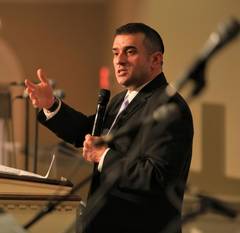- About Us
- Learning
- Resources
- Get Involved
- Membership
- Jobs
Emor: What a Jew does
04/27/2021 04:08:01 PM
Rabbi Brent Spodek
| Author | |
| Date Added | |
| Automatically create summary | |
| Summary |
More than almost any other parshah in the Torah, Parshat Emor is packed densely with commandments.
Coming fast and furious, there are commandments which define the requirements for the ancient priests, commandments which define the purity of the animal sacrifices in the Temple and commandments which establish the holiday calendar. But tucked among the 63 commandments of this weeks parsha, there is one mitzvah which the rabbinic tradition elevated to an unusually high status. The Torah says that a Jew “must leave the edges of his field and the gleanings of his harvest for the poor and the stranger,” and the rabbinic tradition decided that this particular commandment is an indispensable part of the process for conversion to Judaism.
Traditionally, there are two components to the ritual through which a Gentile transforms into a Jew – some address the body and others, belief and practice. With regard to the body, the rabbinic tradition demands that all converts immerse in the mikva, the ritual equivalent of the womb of a Jewish woman, and that men get circumcised in the name of conversion. In these respects, the ritual of conversion replicates the bodily aspects of the covenant between God and Abraham.
In addition to these physical changes, the rabbis of the Talmud also mandated changes in the thoughts and behaviors of a convert. They said that the rabbi supervising the conversion should inform the convert of the persecution which Jews often face and should choose a few simple and a few complicated commandments to teach the convert. Very specifically, however, the rabbi is also required to teach the convert about this commandment - that a Jew must leave the edges of his field and the gleanings of his harvest for the poor and the stranger.
It seems strange that while the rabbis thought that any of the other myriad commandments of the Torah would do in order to explain Jewish law generally, this one had to be mentioned. Why not require that the convert be informed of Shabbat, prayer, kashrut or any of the other mainstays of Jewish life?
Perhaps the rabbis were subtly suggesting that while Shabbat, prayer, kashrut are incredibly important things which Jews do, concern for how the poor and the stranger are going to eat tonight is part of what a Jew is.
From the time of the Torah to today, there have been Jews who have been very interested in observing the ritual mitzvot and Jews who have been less interested – but without a doubt, they have all been Jews. But compassion is seen as such an indispensable part of what it is to be Jewish that a Jew who is cruel is suspected of not being Jewish at all.
The rabbis of the Talmud relate a story in which King David declares that mercy, modesty and benevolence were the characteristics which define who could possibly be considered part of the Jewish people. It is as if King David is saying “Of course people who don’t believe in God, or don’t care about Shabbat, or who aren’t interested in kashrut can be Jewish in essence. But can there be Jews who are cruel and indifferent to suffering? No – that’s impossible.” Hundreds of years later, this story was codified as part of Jewish law, establishing that, for communal purposes, someone who is hateful or cruel is suspected of not really being a Jew.
It seems the Talmudic tradition wants this particular verse from Parshat Emor to be the one explicit piece of the conversion ceremony in order to make it clear that to be a Jew is to be constantly aware of the responsibility to look out for the hungry of the world. Abraham, the paradigmatic Jew was confronted with three strangers, whom he very well might have thought were idolaters, and nevertheless, he ran to offer them water, food and shelter. Those of us who imagine ourselves as the heirs of Abraham, either through blood or through conversion, inherit this difficult tradition of unending concern for the well-being of other people.
In establishing the instruction to leave the corners of the field for hungry and the stranger, it is as if the rabbis were saying that there are many aspects to being Jewish, but only one of them is essential – to be perpetually turned outward in a posture of compassion, to be perpetually concerned about others.
Fri, October 31 2025
9 Cheshvan 5786
RABBI BRENT SPODEK

Join Our Mailing List
Privacy Settings | Privacy Policy | Member Terms
©2025 All rights reserved. Find out more about ShulCloud


